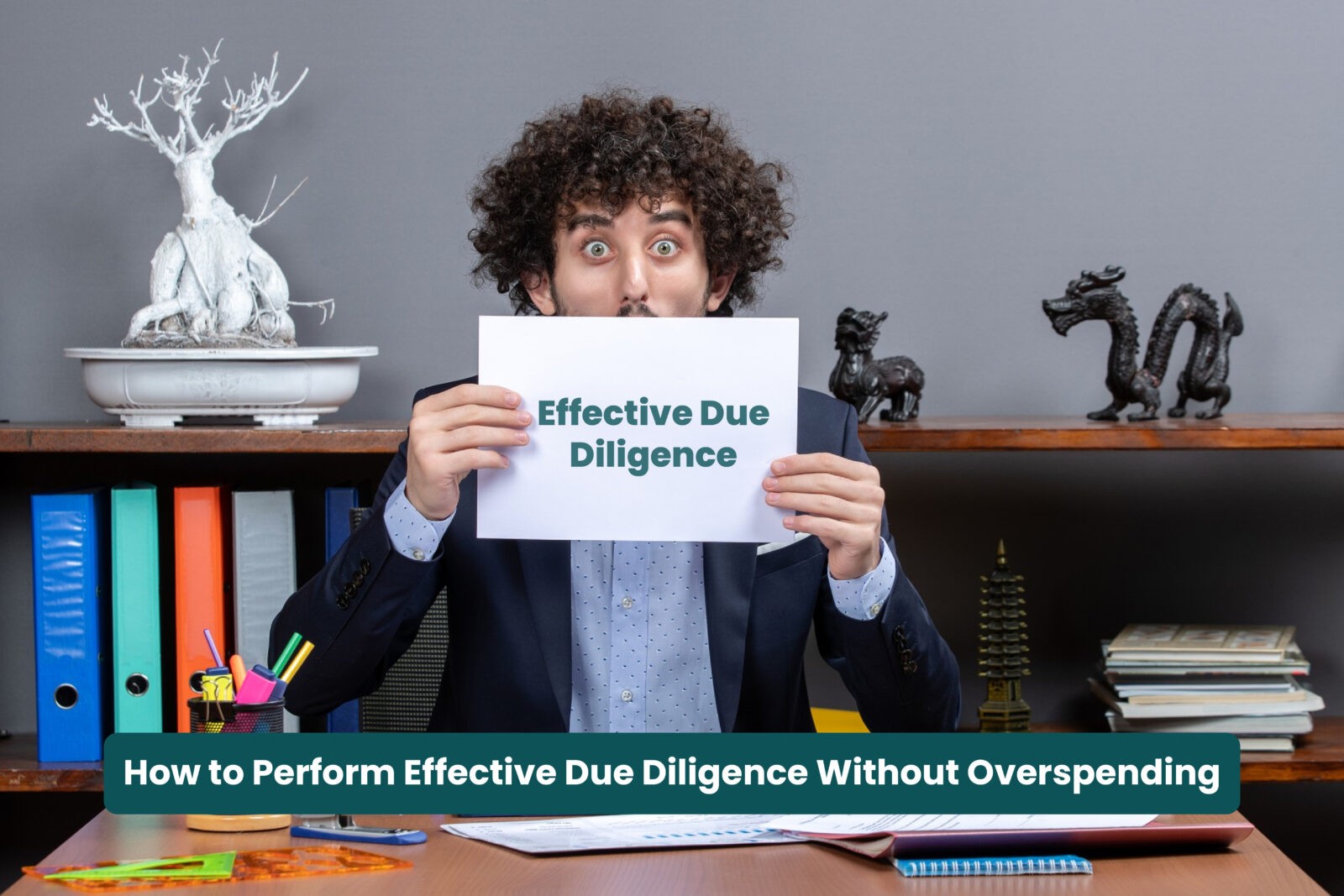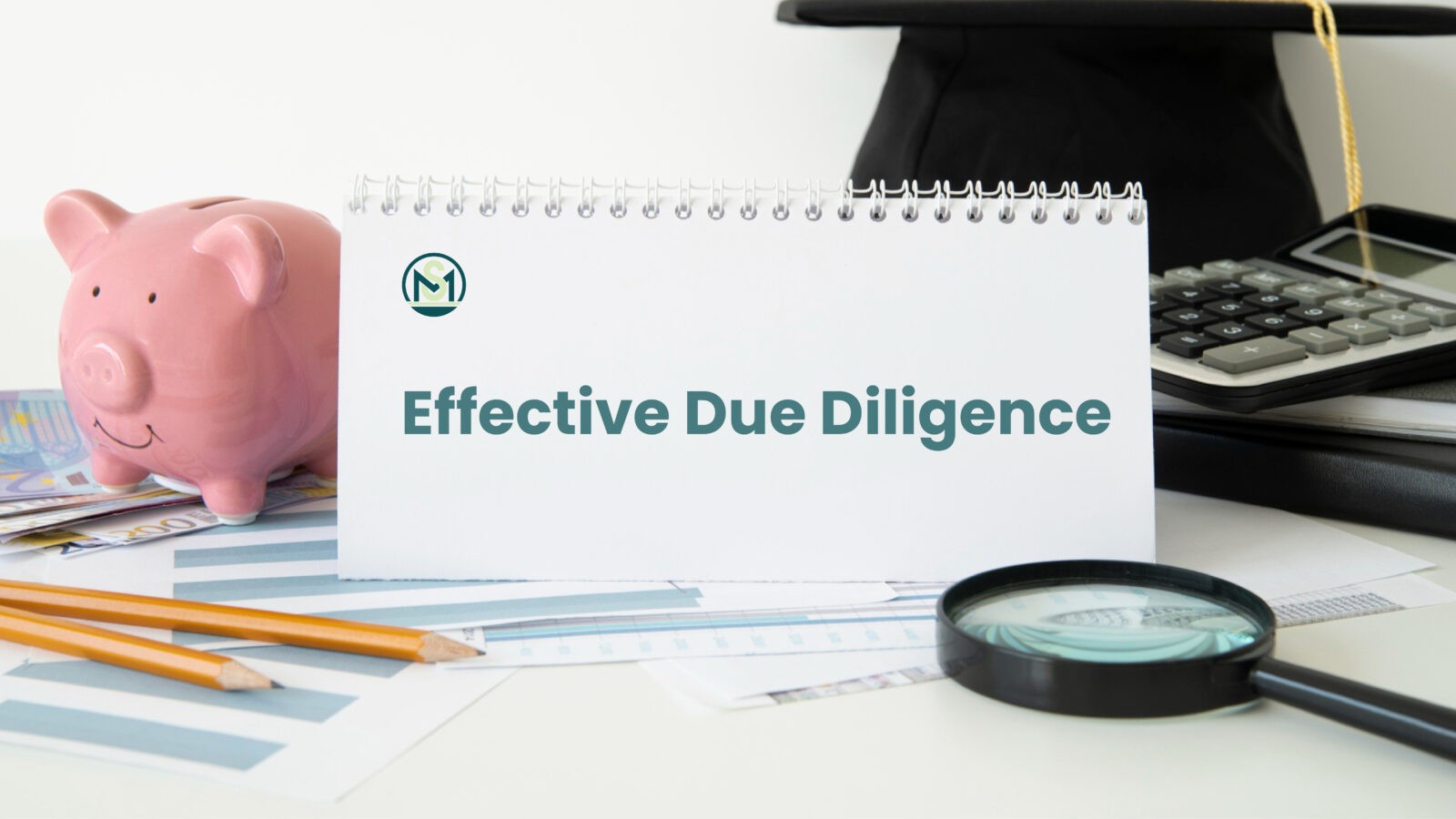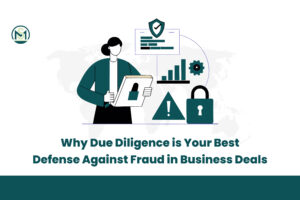Have you ever felt like you need a whole legal team and a truckload of cash just to check if an investment is safe?
That’s the trap most businesses fall into, thinking that adequate due diligence only comes at a high cost.
The truth? You can conduct due diligence without overspending, cutting corners, missing red flags, or compromising your peace of mind.
This article guides you through how to conduct cost-effective due diligence that provides clarity, confidence, and control without draining your budget.
What is Due Diligence?
Due diligence is the process of thoroughly investigating a person, business, or investment before entering into a deal. It’s like fact-checking before buying a car; you check the engine, verify ownership, look at accident history, and you don’t just believe what the seller says.
In business, due diligence includes checking:
- Financial records
- Legal obligations
- Tax filings
- Regulatory compliance
- Customer contracts
- Intellectual property
- Market risks
Now, let’s discuss how to approach this strategically and affordably.
Why You Don’t Need to Burn Cash for Due Diligence
Many startups and small businesses feel stuck. They either:
Overspend on consultants and lawyers
Or skip due diligence entirely because they think they can’t afford it
Both are risky.
Instead, you need a middle path and an efficient due diligence process that saves money, time, and future regret.
Let’s break it down.
Step-by-Step: How to Perform Diligence Without Overspending
1. Start With a Checklist (Don’t Wing It)
You’d be surprised at how many businesses enter due diligence without a clear plan.
Use a strategic due diligence checklist to streamline your process. This minimizes back-and-forth, reduces unnecessary hiring, ensures you don’t forget key areas, and helps you maintain Diligence Without Overspending.
Your basic checklist should cover the following:
- Financials: Profit & Loss, Cash Flow, Balance Sheet, Debts
- Legal: Contracts, Licenses, Pending litigation, NDAs
- HR: Employee contracts, Benefits, Disputes
- Compliance: Regulatory filings, licenses
- IP & Assets: Patents, trademarks, equipment
- Customers & Vendors: Key accounts, dependencies
You can download free templates online. This is one of the best tools
for low-cost due diligence.
2. Use Online Tools (They’re Game-Changers)
Forget expensive audit firms (at least in the beginning). Here are cost-effective due diligence tools that support Diligence Without Overspending.
- SECP eServices: To check company registration and directors in Pakistan
- FBR Taxpayer Profile Inquiry: Verify tax compliance
- NADRA e-Verification: For CNIC checks
- Google Alerts: Monitor news or legal disputes
- OpenCorporates: Look up international business data
- QuickBooks or Xero: If you’re evaluating financial health
These digital tools help you perform due diligence on a budget with speed and accuracy.
3. Interview the Right People, Not Everyone
You don’t need to talk to 20 team members.
Instead, focus on decision-makers and core department heads.
Ask questions like:
- “What are your top financial risks right now?”
- “Have there been any major legal disputes in the last 3 years?”
- “Who are your top 5 customers, and how stable are they?”
- “Do you have any tax notices or compliance issues pending?”
This helps you assess risk without over-engaging costly resources.
4. Review Documents in Phases
Don’t try to analyze everything on day one.
Instead, break the due diligence into phases:
- Phase 1: Surface-level review (basic red flags)
- Phase 2: Financial & legal review
- Phase 3: Operational and risk analysis
This phased method is an efficient due diligence process that saves costs. You avoid paying for document review services upfront when a red flag may stop the deal anyway.
5. Use Internal Staff Where Possible
If you have a finance manager, legal officer, or HR person, let them lead.
Many businesses rush to hire external consultants. But you already pay your team, so use their knowledge and context.
They may not be “due diligence experts,” but they know your industry better than outsiders and can save you thousands.
Only hire outside help if there’s a legal or technical area beyond your scope.
6. Avoid Fancy Reports, Go for Clarity
Don’t spend money on a 50-page glossy due diligence report.
Instead, build a simple summary:
| Section | Status | Notes |
| Legal Contracts | ✅ | 3 valid, one expired |
| FBR Returns | ❌ | 2 years missing |
| Key Clients | ✅ | All are on long-term contracts |
| Pending Lawsuits | ❌ | One labor dispute is ongoing |
This keeps things clear for you and any stakeholders and saves money on reporting design.
7. Don’t Ignore Red Flags Just Because It’s Cheap
Practicing Diligence Without Overspending doesn’t mean you ignore warning signs.
If a company has:
- No clear tax history
- Unregistered employees
- Lawsuits, they won’t disclose
- Inflated revenue claims
It’s better to walk away than rush a decision because “the price is low.”
Cheap deals with hidden risks are never cost-effective.
Strategic Due Diligence: Think Like an Investigator
What makes strategic due diligence different is its focus on Diligence Without Overspending.
You stop looking at documents like a checklist and start asking: “What could go wrong if this part fails?”
For example:
- Does the business rely on one major client? That’s a risk.
- Are licenses set to expire soon? That could delay operations.
- Are profits up, but cash flow down? That’s suspicious.
Ask Why. Always. That’s how you uncover real risks, not just surface issues.
Due Diligence Rules and Regulations in Pakistan
In Pakistan, due diligence is especially critical due to:
- Limited transparency in SMEs
- Tax non-compliance among vendors
- Informal labor practices
Here are the key regulations you must comply with:
1. SECP Requirements
If you’re buying equity or shares:
- Verify corporate structure via the SECP
- Review Articles of Association
- Check for board resolutions authorizing share transfer
2. FBR Compliance
- Ensure the business files regular income and sales tax returns
- Check for Active Taxpayer List (ATL) status
- Examine audit notices or tax penalties
3. Labor Laws
- Verify if employees are registered with EOBI and Social Security
- Confirm compliance with the Minimum Wage Act
- Review employment contracts to ensure they meet legal requirements
4. Anti-Money Laundering (AML) Checks
If it’s a significant transaction, ensure Know Your Customer (KYC) and source of funds documentation is available
Under FATF compliance, transactions above PKR 2 million require financial documentation
This adds a layer of responsibility. Diligence without overspending in Pakistan still requires staying compliant with these local laws.
Common Mistakes That Cost You (Avoid These)
Even when businesses try to save money, they often make costly errors:
- Blindly trusting the seller’s word
- Skipping compliance checks to save legal costs
- Not verifying financial data with original source documents
- Ignoring customer churn or delayed receivables
- Underestimating cultural or political risks in partnerships
You don’t need fancy firms, just focused questions, sharp eyes, and patience.
Tools for Low-Cost Due Diligence
Here’s a quick list of free or low-cost tools that make diligence easier:
| Tool | Purpose |
| SECP eServices | Verify business registration & directors |
| FBR ATL & Tax Profiling | Taxpayer Compliance |
| NADRA e-Verify | CNIC identity verification |
| Google Alerts | Monitor legal news & reputational risk |
| Canva | Create basic reports and checklists |
| QuickBooks/Xero | Review or simulate financials |
| ChatGPT | Draft due diligence questions/checklists |
Using these tools helps you perform due diligence on a budget without sacrificing quality.
Smart Due Diligence: Achieve Results with Diligence Without Overspending
Here’s the truth: A lot of deals fall apart not because they were bad but because the buyer didn’t know what they were buying.
Due diligence gives you the truth before the trouble. And you don’t need to spend millions to get there.
By following the steps we’ve discussed, you can perform diligence without overspending while protecting your future, your team, and your investments.
How One Business Did Diligence Without Overspending
Let’s bring all this theory into practice.
Ahmed, a mid-level investor from Lahore, was considering buying a 40% stake in a small packaging company. He didn’t have the budget for a full audit or a big consulting firm. But he didn’t want to walk in blind either.
So what did he do?
- He downloaded a free due diligence checklist from a startup law site.
- He visited SECP and verified the company’s registration, board of directors, and shareholding structure.
- Using the FBR’s online taxpayer profile tool, he confirmed that the business was an Active Taxpayer and had filed the last 3 years of returns.
- He requested profit and loss statements and used a free Excel template to analyze the trends.
- He had a 30-minute Zoom call with the company’s HR head to discuss employee benefits and potential legal disputes.
He only spent a total of PKR 25,000 (mainly for a one-time legal opinion on contract validity). And guess what? He discovered that two key contracts with their top clients were not formally signed, meaning the revenue shown was not guaranteed.
That red flag helped him negotiate a lower valuation and saved him over PKR 1.5 million in the long run.
This is the perfect example of diligence without overspending in the real world.
Due Diligence Questions That Save You Money
Whether you’re evaluating a business, a vendor, or a partner, asking the right questions early can prevent costly mistakes later.
Here are a few:
Legal:
- “Are there any ongoing lawsuits or compliance notices?”
- “Can I see a copy of your registration and tax filings?”
Financial:
- “What percentage of your revenue comes from your top 3 clients?”
- “Do you have any unpaid taxes, loans, or defaults?”
Operational:
- “What’s your employee turnover rate in the past 12 months?”
- “Do you have backup suppliers in case of disruption?”
These help you uncover critical risks early, delivering Diligence Without Overspending by saving hours of legal fees and damage control.
It’s Not About Spending Less, It’s About Spending Smart
Doing due diligence doesn’t mean you must hire the most expensive consultants or buy premium software.
But it does mean you invest smartly in the areas that matter most:
- Legal contracts
- Tax and regulatory compliance
- Financial Health
- Key risks and dependencies
When you know exactly where to look, you spend less and gain more.
That’s what real cost-effective due diligence is all about: empowering your business through Diligence Without Overspending, and not exhausting your resources.
How MSAFDAR Can Help You Do Smarter Due Diligence?
At MSAFDAR, we help businesses dig deep without going broke. Whether you’re planning to acquire a company, invest in a startup, or vet a vendor, we streamline the entire due diligence process on a budget.
From SECP checks to tax reviews, from contract evaluations to financial analysis, we provide cost-effective due diligence that’s both fast and reliable. With MSAFDAR, you get Diligence Without Overspending, ensuring smart decisions without financial strain.
Ready to perform due diligence the smart way?
FAQs:
Q1: Can I perform due diligence myself without hiring a lawyer?
Yes. Use a checklist to review key areas, including finances, contracts, and licenses. Only bring in legal help for complex matters.
Q2: What’s the most considerable risk of skipping due diligence?
You could inherit debt, legal trouble, or tax issues, all of which could wipe out your profits.
Q3: How long does a basic due diligence process take?
For SMEs, it can take 5–10 days. For larger companies, allow 3–4 weeks.
Q4: Does the law require due diligence in Pakistan?
It’s not always required, but it’s highly recommended, especially under SECP and FBR scrutiny, when acquiring shares or significant assets.
Q5: What’s the cheapest way to perform due diligence?
Use internal teams, government portals (like SECP and FBR), and digital tools to perform initial reviews and hire experts only when essential.




